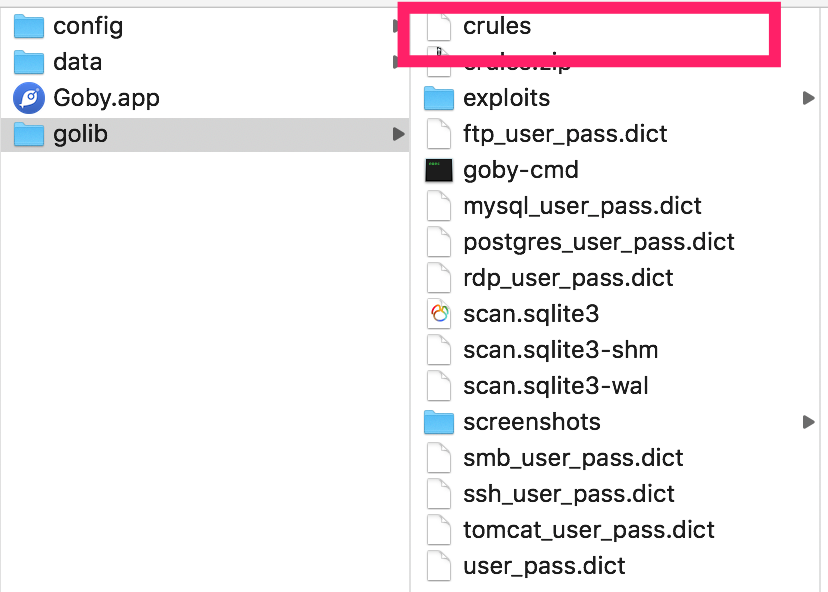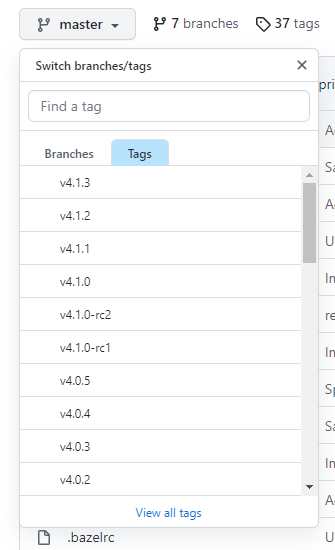
goby识别指纹的功能很不错,想试试能不能把goby指纹识别里面的指纹提取出来,移植到自己的扫描器中,结果后面到了逆向虚拟机的程度。。
goby的crules
在goby 最初的版本中,翻看了一些感兴趣的资源文件后看到有个crules文件。

它的文件头是yara文件

并且里面包含了它的指纹

通过文本提取,可以把指纹规则提取出来,但是多个指纹规则之间有and、or之类的逻辑关系,并不清楚。
新版的crules提取
现在goby使用了最新的go版本1.16

在go1.16,嵌入资源有个官方实现,叫go embed,可以根据在二进制中搜索embed.FS来确认是否使用了这个特性。
然后我自己测试了一下,看看go embed内嵌资源是如何实现的,结果发现资源直接在二进制中明文显示。
于是搜索YARA关键字,就能再次定位到goby的指纹规则部分。


yara结构分析
因为不知道指纹规则之间的逻辑关系如何提取,所以只能看yara代码是怎么做的。
看到goby使用了这个库https://github.com/hillu/go-yara,应该就是用来解析规则的,看这个库的实现,它只是c版本yara源码的封装,所以还是要去看yara的代码。
官方仓库是 https://github.com/VirusTotal/yara
我下载了2.0 3.0 和4.x最新版的源码,发现里面的文件版本和这个都对不上。一度怀疑是魔改的yara?

yara编译后文件的规则真是多变,并且每个版本的规则还不兼容。。这上面踩了一下坑。
最后我在yara-3.10.0找到了可以符合goby crules文件头的代码
yara加载编译后的文件
在yr_arena_load_stream,可以看到读取magic为yara的标记以及版本判断相关代码。

crules文件开头对应的数据结构如下
typedef struct _ARENA_FILE_HEADER { char magic[4]; uint32_t size; uint32_t version; } ARENA_FILE_HEADER;
之后读取指定长度的字节后,剩余的字节都是用于重定向地址用

再之后在 yr_rules_load_stream,先通过一个结构映射头
typedef struct _YARA_RULES_FILE_HEADER { DECLARE_REFERENCE(YR_RULE*, rules_list_head); DECLARE_REFERENCE(YR_EXTERNAL_VARIABLE*, externals_list_head); DECLARE_REFERENCE(const uint8_t*, code_start); DECLARE_REFERENCE(YR_AC_MATCH_TABLE, match_table); DECLARE_REFERENCE(YR_AC_TRANSITION_TABLE, transition_table); } YARA_RULES_FILE_HEADER;
然后再解析出每个节的地址。

new_rules->code_start = header->code_start; new_rules->externals_list_head = header->externals_list_head; new_rules->rules_list_head = header->rules_list_head; new_rules->match_table = header->match_table; new_rules->transition_table = header->transition_table;
得到每个表的位置。yara编译后的文件加载过程到此完成。
简单来说,文件头前面一部分是映射为_ARENA_FILE_HEADER的结构,再之后的结构就是一些表的地址。
yara结构总结
说的可能比较抽象,得自己看yara代码,不断去调试,大概就知道yara是怎么处理和加载编译后的yara文件的了。
yara的编译机制就是把内存中的yara数据结构保存为一个文件,然后对一些重定向内容做一些处理。
加载过程也是同理,之后程序运行位置交到new_rules->code_start这个地址上,它将会运行yara的虚拟机程序,虚拟机对所有规则做出判断。
yara虚拟机
整个虚拟机执行在exec.c文件的yr_execute_code函数上,在上面打上断点。

此时的调用堆栈

单步运行下来,发现这是一个栈式虚拟机,从地址获取opcode,根据opcode执行。

OP_HALT是中断标志,这个opcode出现代表执行完毕。
exec.h定义了各种opcode和int的关系

经过调试,发现每次规则开始的时候,都会调用OP_INIT_RULE,

这个执行地址后面的地址就是RULE的数据结构,记录了meta等信息。
typedef struct _YR_INIT_RULE_ARGS { DECLARE_REFERENCE(YR_RULE*, rule); DECLARE_REFERENCE(const uint8_t*, jmp_addr); } YR_INIT_RULE_ARGS;
typedef struct _YR_RULE { int32_t g_flags; // Global flags int32_t t_flags[MAX_THREADS]; // Thread-specific flags DECLARE_REFERENCE(const char*, identifier); DECLARE_REFERENCE(const char*, tags); DECLARE_REFERENCE(YR_META*, metas); DECLARE_REFERENCE(YR_STRING*, strings); DECLARE_REFERENCE(YR_NAMESPACE*, ns); // Used only when PROFILING_ENABLED is defined clock_t clock_ticks; } YR_RULE;
typedef struct _YR_META { int32_t type; YR_ALIGN(8) int64_t integer; DECLARE_REFERENCE(const char*, identifier); DECLARE_REFERENCE(char*, string); } YR_META;
通过对虚拟机整个执行过程的理解,可以编写一个yara反编译器了。
搜索了下github,有一个开源的 https://github.com/jbgalet/yaradec,但是不支持这个版本,需要自己改改。
所以我根据yara源码和这个开源的反编译器,编写了一个yara反编译器。
反编译
运行反编译器,将yara的opcode转换为指令的形式,我的反编译器运行后输出如下

有的opcode会和一些字符串作关联,所以我把它读取出来放到注释部分,opcode就是yara定义的opcode,最前面的数字代表当前执行的位置,因为有的语句会跳转到其他位置,方便看。
接下来就是理解这些yara指令了。
一个简单的例子
205 : OP_INIT_RULE ;{"flags": 0, "identifier": "rule_2", "metadata": {"rule_id": "2", "level": "5", "softhard": "2", "product": "CNPOWER-OA(OA8000)", "company": "CNPOWER", "category": "OA", "parent_category": "Enterprise Application"}, "ns": "default:"}
222 : OP_OBJ_LOAD 5050743 ;fofa
231 : OP_OBJ_FIELD 5050748 ;body_contains
240 : OP_PUSH 5050762 ;/oaapp/webobjects/oaapp.woa
249 : OP_CALL 5050801 ;s
258 : OP_OBJ_VALUE ;
259 : OP_MATCH_RULE 260 ;OP_INIT_RULE 是初始化这个规则的meta信息
OP_OBJ_LOAD 是载入fofa模块
OP_OBJ_FIELD是模块的字段,即 body_contains
OP_PUSH 将/oaapp/webobjects/oaapp.woa压入堆栈
之后OP_CALL调用函数,OP_OBJ_VALUE 获取结果,OP_MATCH_RULE匹配完成。
所以,可以想象这一段指令对应的原先规则为
fofa.body_contains("/oaapp/webobjects/oaapp.woa")规则逻辑的反编译
上述是一个简单匹配过程,如果一些规则含有逻辑运算,是怎样的呢?
例如下面的例子
445 : OP_INIT_RULE ;{"flags": 0, "identifier": "rule_5", "metadata": {"rule_id": "5", "level": "3", "softhard": "2", "product": "MongoDb", "company": "MongoDB, Inc", "category": "Database System", "parent_category": "Software System"}, "ns": "default:"}
462 : OP_OBJ_LOAD 5051424 ;fofa
471 : OP_OBJ_FIELD 5051429 ;body_contains
480 : OP_PUSH 5051443 ;<a href="/_replset">replica set status</a></p>
489 : OP_CALL 5051501 ;s
498 : OP_OBJ_VALUE ;
499 : OP_JTRUE 642 ;if sucess
508 : OP_OBJ_LOAD 5051503 ;fofa
517 : OP_OBJ_FIELD 5051508 ;protocol_contains
526 : OP_PUSH 5051526 ;mongodb
535 : OP_CALL 5051545 ;s
544 : OP_OBJ_VALUE ;
545 : OP_JTRUE 640 ;if sucess
554 : OP_OBJ_LOAD 5051547 ;fofa
563 : OP_OBJ_FIELD 5051552 ;body_contains
572 : OP_PUSH 5051566 ;you are trying to access mongodb
581 : OP_CALL 5051610 ;s
590 : OP_OBJ_VALUE ;
591 : OP_JTRUE 638 ;if sucess
600 : OP_OBJ_LOAD 5051612 ;fofa
609 : OP_OBJ_FIELD 5051617 ;title_contains
618 : OP_PUSH 5051632 ;mongod.exe
627 : OP_CALL 5051654 ;s
636 : OP_OBJ_VALUE ;
637 : OP_OR ;
638 : OP_NOP ;
639 : OP_OR ;
640 : OP_NOP ;
641 : OP_OR ;
642 : OP_NOP ;
643 : OP_MATCH_RULE 644 ;从这段指令可以精简为
验证规则1
验证规则2
验证规则3
验证规则4
or
or
or可以看出这是一个后缀表达式(逆波兰表达式)处理的逻辑关系。
要提取逻辑表达式的话,就是把这段后缀表达式转换为可读的中缀表达式。
我写了一个python脚本来完成这个操作
def zhuanh(l: list): l.reverse() s = [] fuhao = ['OP_AND', 'OP_OR', 'OP_NOT'] while len(l) > 0: x = l.pop() if x not in fuhao: s.append(x) else: r1 = s.pop() if x == 'OP_NOT': s.append("!{}".format(r1)) else: r2 = s.pop() x = x.replace("OP_AND", "and") x = x.replace("OP_OR", "or") s.append(f"({r1} {x} {r2})") if len(s) != 1: raise Exception("错误") return s[0] if __name__ == '__main__': a = [1, 2, 3, 4, 'OP_OR', 'OP_OR', 'OP_OR'] s = zhuanh(a) print(s)
1,2,3,4代表这四个规则,最后输出结果即

接下来找一个规则复杂一些的尝试一下
1229 : OP_INIT_RULE ;{"flags": 0, "identifier": "rule_9", "metadata": {"rule_id": "9", "level": "5", "softhard": "2", "product": "TongDa-OA", "company": "TongTa", "category": "OA", "parent_category": "Enterprise Application"}, "ns": "default:"}
1246 : OP_OBJ_LOAD 5052822 ;fofa
1255 : OP_OBJ_FIELD 5052827 ;body_contains
1264 : OP_PUSH 5052841 ;/static/templates/2013_01/index.css/
1273 : OP_CALL 5052889 ;s
1282 : OP_OBJ_VALUE ;
1283 : OP_JTRUE 1810 ;if sucess
1292 : OP_OBJ_LOAD 5052891 ;fofa
1301 : OP_OBJ_FIELD 5052896 ;body_contains
1310 : OP_PUSH 5052910 ;javascript:document.form1.uname.focus()
1319 : OP_CALL 5052961 ;s
1328 : OP_OBJ_VALUE ;
1329 : OP_JTRUE 1808 ;if sucess
1338 : OP_OBJ_LOAD 5052963 ;fofa
1347 : OP_OBJ_FIELD 5052968 ;body_contains
1356 : OP_PUSH 5052982 ;href="/static/images/tongda.ico"
1365 : OP_CALL 5053026 ;s
1374 : OP_OBJ_VALUE ;
1375 : OP_JTRUE 1806 ;if sucess
1384 : OP_OBJ_LOAD 5053028 ;fofa
1393 : OP_OBJ_FIELD 5053033 ;body_contains
1402 : OP_PUSH 5053047 ;<link rel="shortcut icon" href="/images/tongda.ico" />
1411 : OP_CALL 5053113 ;s
1420 : OP_OBJ_VALUE ;
1421 : OP_JTRUE 1804 ;if sucess
1430 : OP_OBJ_LOAD 5053115 ;fofa
1439 : OP_OBJ_FIELD 5053120 ;body_contains
1448 : OP_PUSH 5053134 ;oa提示:不能登录oa
1457 : OP_CALL 5053171 ;s
1466 : OP_OBJ_VALUE ;
1467 : OP_JFALSE 1514 ;if sucess
1476 : OP_OBJ_LOAD 5053173 ;fofa
1485 : OP_OBJ_FIELD 5053178 ;body_contains
1494 : OP_PUSH 5053192 ;紧急通知:今日10点停电
1503 : OP_CALL 5053236 ;s
1512 : OP_OBJ_VALUE ;
1513 : OP_AND ;
1514 : OP_NOP ;
1515 : OP_JTRUE 1802 ;if sucess
1524 : OP_OBJ_LOAD 5053238 ;fofa
1533 : OP_OBJ_FIELD 5053243 ;title_contains
1542 : OP_PUSH 5053258 ;office anywhere 2013
1551 : OP_CALL 5053290 ;s
1560 : OP_OBJ_VALUE ;
1561 : OP_JTRUE 1800 ;if sucess
1570 : OP_OBJ_LOAD 5053292 ;fofa
1579 : OP_OBJ_FIELD 5053297 ;title_contains
1588 : OP_PUSH 5053312 ;office anywhere 2015
1597 : OP_CALL 5053344 ;s
1606 : OP_OBJ_VALUE ;
1607 : OP_JTRUE 1798 ;if sucess
1616 : OP_OBJ_LOAD 5053346 ;fofa
1625 : OP_OBJ_FIELD 5053351 ;body_contains
1634 : OP_PUSH 5053365 ;tongda.ico
1643 : OP_CALL 5053387 ;s
1652 : OP_OBJ_VALUE ;
1653 : OP_JFALSE 1748 ;if sucess
1662 : OP_OBJ_LOAD 5053389 ;fofa
1671 : OP_OBJ_FIELD 5053394 ;title_contains
1680 : OP_PUSH 5053409 ;oa
1689 : OP_CALL 5053423 ;s
1698 : OP_OBJ_VALUE ;
1699 : OP_JTRUE 1746 ;if sucess
1708 : OP_OBJ_LOAD 5053425 ;fofa
1717 : OP_OBJ_FIELD 5053430 ;title_contains
1726 : OP_PUSH 5053445 ;办公
1735 : OP_CALL 5053463 ;s
1744 : OP_OBJ_VALUE ;
1745 : OP_OR ;
1746 : OP_NOP ;
1747 : OP_AND ;
1748 : OP_NOP ;
1749 : OP_JTRUE 1796 ;if sucess
1758 : OP_OBJ_LOAD 5053465 ;fofa
1767 : OP_OBJ_FIELD 5053470 ;body_contains
1776 : OP_PUSH 5053484 ;class="style1">新oa办公系统
1785 : OP_CALL 5053528 ;s
1794 : OP_OBJ_VALUE ;
1795 : OP_OR ;
1796 : OP_NOP ;
1797 : OP_OR ;
1798 : OP_NOP ;
1799 : OP_OR ;
1800 : OP_NOP ;
1801 : OP_OR ;
1802 : OP_NOP ;
1803 : OP_OR ;
1804 : OP_NOP ;
1805 : OP_OR ;
1806 : OP_NOP ;
1807 : OP_OR ;
1808 : OP_NOP ;
1809 : OP_OR ;
1810 : OP_NOP ;
1811 : OP_MATCH_RULE 1812 ;优化为的后缀表达式
1
2
3
4
5
6
and
7
8
9
10
11
or
and
12
or
or
or
or
or
or
or
or后缀表达式转中缀表达式结果
((((((((12 or ((11 or 10) and 9)) or 8) or 7) or (6 and 5)) or 4) or 3) or 2) or 1)就这样,能将所有规则之间的逻辑关系处理了。
中缀表达式处理程序有一个小问题,就是表达式的括号会很多,这个自行优化下吧 = -
最后
我将规则处理为了json格式,方便阅读和扫描器引用,类似如下

goby因为只需要访问一次首页,剩下的由yara规则进行识别,所以速度会很快。用yara识别web指纹学习到了。
如果要自己写扫描器引入fofa指纹的话,还需要写个表达式解析器来解析各种规则,这个我以前也写过了 https://x.hacking8.com/post-383.html
那么能不能直接用yara调用goby的指纹呢?
理论上是可以的,只是需要自己写一个名称为fofa的模块,实现所有判断的方法,在编译到yara中。
如有侵权请联系:admin#unsafe.sh